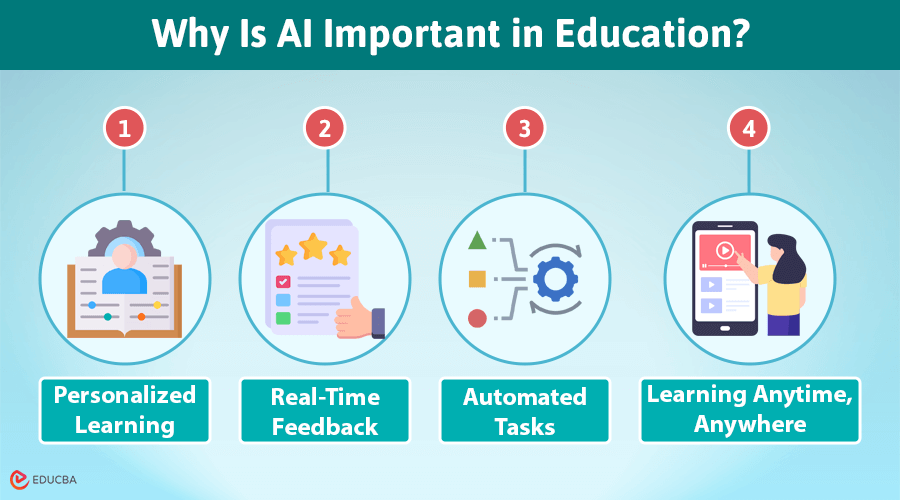What is AI in Edtech?
AI in Edtech refers to using artificial intelligence in educational technology to improve the learning experience. It involves using smart computer systems to create personalized lessons, automate tasks like grading, and provide real-time feedback to students. This makes learning more engaging, efficient, and customized for each student’s needs, benefiting both students and teachers.
Recent research shows that the global Edtech market is projected to grow from $146 billion in 2023 to $549.6 billion by 2033, with a compound annual growth rate (CAGR) of 14.2%. This growth highlights the increasing adoption of AI in Edtech as a key driver of change in the education sector.
Why Is AI Important in Education?
AI is helping to make education more efficient in several ways:
- Personalized Learning: AI systems can adapt lessons to suit individual students’ learning styles and pace. Students can go at speed, focusing on areas where they need help most.
- Automated Tasks: Teachers spend a lot of time grading and managing classroom activities. AI handles grading quizzes and assignments, giving teachers more time to focus on teaching.
- Real-Time Feedback: AI-powered platforms can track students’ progress and give instant feedback. This helps students learn from their mistakes quickly and improve faster.
- Learning Anytime, Anywhere: With AI in Edtech, students can access learning materials online from anywhere, at any time. This is especially helpful for those who cannot attend regular classes or need extra learning support.
Cloud-Based vs. On-Premises AI Solutions
When adopting AI in Edtech, institutions choose cloud-based and on-premises solutions.
- Cloud-based solutions are widely favored because they are flexible, easy to scale, and cost-efficient. Institutions can scale resources and access updates easily without needing extensive hardware.
- On-premises solutions offer more control over data and systems, making them suitable for institutions with strict security requirements. However, they come with higher costs and maintenance needs, which is why cloud-based systems are more widely used.
AI in Different Educational Settings
AI is useful in various parts of the education world, including:
- Schools: AI helps schools create personalized learning plans for students. It also helps with administrative tasks like grading and student performance tracking.
- Universities: In higher education, AI helps improve student retention by identifying struggling students early and offering tailored support. It is also used to simplify admissions by analyzing applicant data. Additionally, tools like LiveCarta’s Curriculum Builder help universities streamline curriculum development, enabling educators to create adaptive and student-centered course outlines.
- Corporate Training: AI is used in the workplace to design training programs that fit each employee’s needs. It helps identify skills gaps and suggests courses to help employees improve.
Challenges and Opportunities
While AI in Edtech brings numerous advantages, it also faces several challenges:
- Data Privacy Concerns: AI systems collect a significant amount of student data. As a result, schools must obey strict guidelines to ensure the safety and privacy of this information.
- Outdated Systems: Many educational institutions still rely on old systems incompatible with modern AI platforms. Upgrading these systems can be expensive, but making the most of AI’s advantages is necessary.
Despite these challenges, AI also presents an exciting opportunity:
Increased Accessibility: AI can enhance education for students in remote or underserved areas by providing personalized learning experiences. This ensures that all students have access to quality education regardless of location.
Integration of AI in Edtech Through VR & AR
One exciting development in Edtech is the combination of AI with virtual reality (VR) and augmented reality (AR). These technologies provide engaging learning experiences that let students discover new ideas in enjoyable and interactive ways. For example, students can take virtual field trips, participate in science experiments, or practice speaking a new language in a realistic setting.
Final Thoughts
AI in Edtech is making education smarter, more efficient, and more accessible. Whether it is creating personalized learning experiences, automating administrative tasks, or providing real-time feedback, AI is helping to improve education for students and teachers alike.
As AI continues to evolve, the future of learning looks bright. By embracing AI-driven tools and platforms, we can create more inclusive, dynamic, and effective learning environments for everyone.
Recommended Articles
We hope this overview helps you understand the role of AI in Edtech. Check out these recommended articles for more insights and tips on leveraging technology to enhance education.


